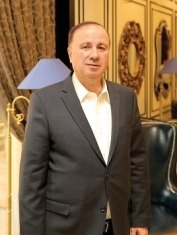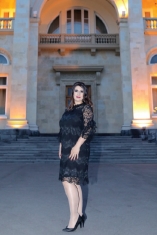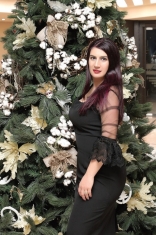




2019-02-05 12:09
Life is an unexpected turn, on the way to which you learn a lot, you lose and find, but what really is yours is eternal - the national identity, language, culture. And one beautiful day it becomes clear that the moment has come to fulfill a dream, to express love and longing, to sincerely gift what you’ve collected and to get the greatest pleasure out of it.
President of “Prime Healthcare” company, American-Armenian philanthropist Mike Sarian, who was included on the list of 25 top Executive Directors of the US healthcare sector back in 2017, is today in Armenia and wishes to contribute to the revolution in Armenia’s healthcare sector. Though he’s always supported his motherland from the United States, he’s never considered it enough, and today he is ready to invest in his motherland not only his material, but also intellectual potential.
-Mr. Sarian, You are a prominent representative of the US healthcare sector, head of a major network that includes 46 hospitals in the US 15 states, philanthropist. As far as we know, You were a teenager, when your family moved to the United States. Please, tell us about your life path, trials that you’ve overcome, as well as about your success.
-Yes, I was 16, when I moved to the United States from Lebanon with my family [with my parents and my brother] and became a US citizen, who has always kept awaken his national self-consciousness and has been loyal to being an Armenian. Although I live in the United States for already 40 years, I’ve never stopped speaking Armenian, thinking and living like an Armenian. I’ve always been clung to my roots; that’s been an inseparable part of my essence, my pride, the cornerstone of my ego. I was born in 1961, in Beirut, Lebanon. There I attended “Nazaryan” Armenian charity school, then “Hovakimyan-Manukyan” Secondary School. In 1978, when the Civil War in Lebanon reached its culmination, our family [me, my mother, father and brother] had to flee Lebanon, and we decided to move to Armenia. I wanted to continue my education in the motherland, but we failed. Thus, we moved and settled in the United States. There I received higher education first in the field of public healthcare and then - in business management. I started my career in the American hospitals, where I was able to reach excellent results showing professional and human qualities. This helped me to increase my responsibilities and to achieve leading positions. As for the trials and difficulties that I encountered, I should mention that I had overcome many difficulties until I was able to become a US citizen, but I don’t like speaking about them, as I’ve never been afraid of difficulties, I’ve believed myself and have demonstrated will to reach all my goals. Today I have a great desire to be useful for my motherland. Perhaps, I haven’t yet reached that goal and today the moment has come.
-Who did help you to succeed in the United States?
-The main guarantee for success in a foreign country is the knowledge of the language. Of course, I knew English, but I couldn’t speak as fluent, as Americans; it took some time. I should note that it took me several years to integrate into the American society and to become a real US citizen. There were also people, who supported me. Alex Nicols was one of them. Unfortunately he passed away several years ago. He was in charge of the hospital and helped me a lot. The other one was also an American with whom I worked in the medical centres. I was 27-28 years old then and started to gradually record serious success. Hospitals, that were supposed to be closed, were being passed under my supervision and I was able to develop them using right business management approaches.
-You are for the first time in Armenia. Why didn’t You visit it before and what’s the reason for Your decision to come and offer Your investment directed to the healthcare sector development to the RA authorities?
-My visit to Armenia was planned a year ago at the invitation of the RA former President Serzh Sargsyan, but it was postponed because of the revolutionary processes in the country. I decided to visit my motherland in more stable period from the political point of view. To be honest, I’ve never wanted to get involved in the political processes, to give assessments. My country and my nation are important for me, and the leaders will come and go. Although I’ve never visited Armenia, I’ve always supported my country through charity programs. In particular, we provided support to the Defense and Healthcare Ministries of the Republic of Armenia. My greatest aspiration is that our country develops, as I’m specialized in the healthcare sector, I want to have an investment and to support the development of that sector in Armenia with my knowledge and experience.
-You have recently met with the RA Acting Minister of Healthcare Arsen Torosyan, Acting Minister of Diaspora Mkhitar Hayrapetyan and Acting Prime Minister Nikol Pashinyan. You expressed an opinion that the RA Healthcare sector needs a revolution. What impression did You get from the meeting with the RA Government members and especially the Prime Minister?
-The meeting with the Acting Prime Minister of Armenia Nikol Pashinyan was held in a warm and peaceful atmosphere. I’m very glad that Armenia has a good and sincere leader like Nikol Pashinyan, who seriously thinks about developing the country without stopping while facing difficulties, and he has a special program for that. It is very important that today there is a fight against corruption and monopoly economies which greatly hider the development of the country and society. Some people have concentrated all the wealth of the country in their hands, and 90% of the nation is poor. It’s unacceptable. It’s a contributing factor for the people to leave the country. I’m glad that today there is a political will to fight against all this. Armenia has been free and independent for already 27 years, but I feel that today my country is awakening, leaving behind all the hard days. The Karabakh war was a hard blow for our motherland. I pray to God for Armenians never see war and our soldiers protect the borders of their country in peaceful and secure conditions, and the sad days of the past are replaced by achievements and victories. And I’m proud to say that at last I can see the light that spreads over both Armenia, and Diaspora. This is my dream, my vision, my wish. And we - the Diaspora-Armenians - should support our motherland not only materially, but also with the professional potential, as well as with love that turned into longing.
-Speaking about the projects, I’d like you to assess the current state of the RA healthcare sector, the activity of the healthcare institutions and to mention what do you mean by saying that there should be a revolution in the sector?
-I’ve visited 8-10 hospitals and only 1-2 out of them were in good conditions. The latter were really well-equipped and were similar to the European or American hospitals, but those 1-2 hospitals can’t give quality to the healthcare system of the country. In other hospitals there were no minimum conditions for keeping the hygiene norms, which is unacceptable and can cause, for example, spread of infections. And health is the most important thing for a person. Without health the life quality of a person decreases causing him suffering and sorrow. Speaking about revolution in the healthcare sector, I first of all mean change of the healthcare system, change of approaches, mentality and working style. I’ve already spoken about the lack of basic conditions in medical centres, another problem is the lack of technical equipment, frequent professional trainings, normal building conditions, as well as proper furnishings. I’ve spoken about small issues, but, of course, there are also big problems that need to be taken seriously. Particularly, great work should be done for the development of healthcare facilities in the regions, so that the people of the region don’t need to come to Yerevan in case of both the smallest and biggest issues, but will be sure enough to use the services of the regional medical centres. We have some projects aimed at supplying the regional medical centres with the equipment. We should form a team through which steps will be taken for solving different issues existing in the sector. I think that it’ll take about three years to reform the entire healthcare system and to create a developed healthcare sector in Armenia similar to the American and European healthcare systems. I want to underline another painful problem; I’ve noticed that there is a great number of smoking people, as well as of those, who like drinking. Smoking is allowed almost everywhere. I think that smoking should be forbidden in the eating places. For example, I can’t eat in a place, where people smoke around me. Maybe it seems that I raise small issues, but believe me, they are very important.
-How would You assess the work of the professional staff working in the RA medical institutions and the technical equipment available there?
-I’m glad to note that Armenian doctors are the brightest point of the RA healthcare system. They are well-trained in their profession and are dedicated to their mission. Especially young specialists are rather well-trained and skilled. They are aware of the newest methods, which is very commendable. Appropriate opportunities should be just created for the development of their skills and knowledge - frequent trainings, requalification trainings, etc. As for the equipment, I must note that I saw the latest generation of the medical equipment only in several medical centres, which doesn’t create quality for the whole system. I give importance to the Minister’s decision on raising the salaries of doctors. It’s a right step; the doctor should be provided with material conditions and should think only about healing the patient, without any expectations while dealing with him. For example, in Germany doctors receive 5-6 thousand USD.
-What kind of investments will be made by You?
-As I’ve mentioned above, we’ll try to bring medical supplies, equipment from the United States to Armenia and to support especially the regional medical centres. I plan to found a pharmaceutical supply company, to import a group of certain medicines, to pack and to consume both here and in third countries.
-What importance do You give to medical insurance in the healthcare sector? For example, there are certain insurance mechanisms in Armenia, but the country isn’t able to provide all its citizens with free medical care.
-Medical insurance is highly important for me, and the best mechanisms of its implementation are realized in the developed countries of the world. First, children and those over the age of 65, who served their country, should receive free medical care sponsored by the government, and second, all the companies should provide their employees with medical insurance taking care of their health care costs. There are many mechanisms that should be invested in our country step by step. The RA citizen should feel protected in his motherland in all aspects. A person, who has a health problem, shouldn’t receive a response from the doctor that he’ll not receive medical care or won’t be operated on unless he doesn’t pay for it. It is unacceptable. The value of a person should rise in Armenia.
-Mr. Sarian, how do You manage to lead such a large hospital network. What are the key management principles that You are guided by?
-First and foremost, creating good and comfortable conditions for all the patients, ensuring high-quality treatment and professional staff, bringing the medical centre to success, creating jobs.
-What’s Your formula of success?
-My formula of success is very clear - confidence in own strength, honesty, loyalty and strong will. Those values are too important for me both in work and in human, friendly relations that continue until the end of one’s life.
-You haven’t been to Armenia for many years, but You preserved the Armenian language, faith, culture. How did you imagine Your motherland, Armenian nation, and what did attract and touch you the most in Armenia?
-Unfortunately, I had never been to Armenia, and when the plane was landing, I can’t describe my excitement; my land touched me. Those moments were amazing. For the first time I walked over the Armenian land, I saw Armenia that I had only seen in pictures and had colored with imagination. Communicating with the people and getting their warm attitude was also exciting for me. And it was a pity for me that only this small land was left from my motherland. I was also very impressed by the scenes of Ararat that I had again seen only in pictures. My visit to the Tsitsernakaberd memorial was also exciting. I’m proud that I was able to visit the village of my grandmother - Adana. My grandmother’s two brothers died in 1914-1915, during the Genocide, and my grandmother and grandfather were sent to Der Zor and were sentenced to death, but, fortunately, they were freed and when the war was over they settled in Adana and built there a house. Unfortunately, under the decree of Mustafa Qemal Ataturk, in 1922 all their wealth was seized and they came to Lebanon through the French navy and settled in Lebanon in 1923. My father was born in Adana, in 1922, before they leave it, and as my grandmother and grandfather were happy that they were free, my father was named Yerjanik (tr. - Happy).
-Please, tell a little bit about Your family. What kind of upbringing did you receive and give to Your children?
-I carry my father’s values, follow his advice and teach the same to my daughter and my brother’s sons. My father always told me to be a good Armenian, honest and truthful, to keep and to remain true to sincere relations and to never lie.
-Do You have a dream that hasn’t come true yet? What kind of Armenia do You dream of?
-My dream is that Armenia becomes a developed, secured, peaceful and rich country. I dream also that the major part of Armenians living in different corners of the world comes back and settles in the motherland, and our country has at least 5 million citizens.
Interview by
Susanna Tamazyan
Translated by
Shoghik Pahlevanyan
Վերադառնալ



